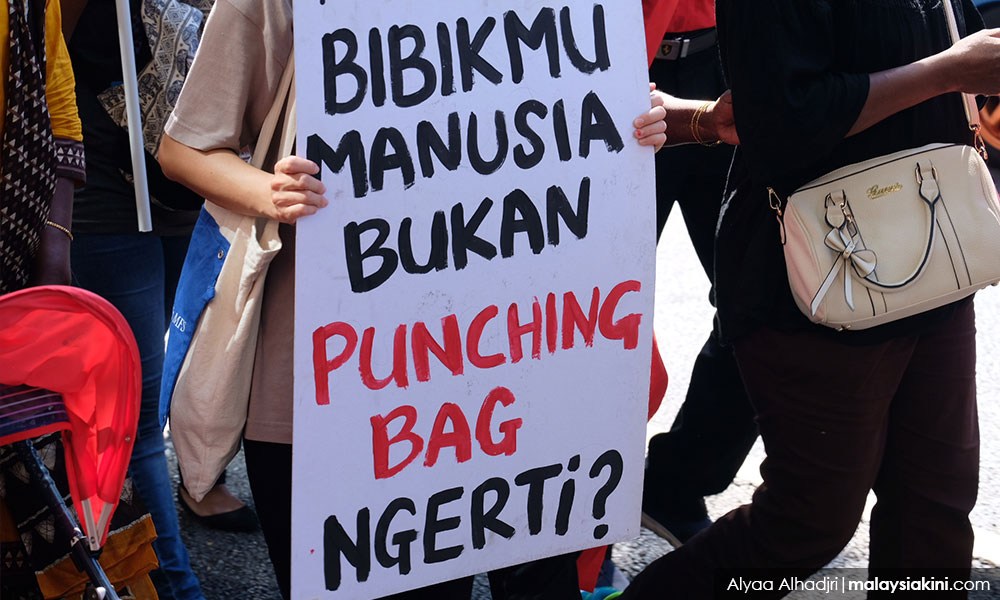The swift investigation into the latest domestic worker abuse case that resulted in human trafficking charges being brought against the employers within eight days should be applauded, said Indonesia’s envoy to Malaysia.
Indonesian Ambassador to Malaysia Hermono welcomed the anti-people-trafficking-related charges brought against the employers yesterday and is calling for the same spirit of efficiency in the legal process to be applied in other domestic worker abuse cases.
A police officer and his wife found themselves pleading not guilty to human trafficking charges at the country’s first Sessions Court dedicated to hearing human trafficking cases located in Klang, less than 10 days after their domestic worker was forced to flee their household in Batu Cave.
However, Hermono was miffed that there was little progress in investigations into other cases with similar elements of physical abuse and forced labour, despite the months or years that have passed.
“The case of Ningrat (not her real name), who was found along the roadside by police, abandoned and disoriented in April, was still being investigated by the Sentul district police station after five months.
“The case was being investigated under Section 323 of the Penal Code and the Labour Department, but no progress has been seen.

Hermono gave another example where a worker was abused and not paid.
“The employer tried at the Sessions Court under trafficking charges was acquitted despite the worker not receiving her wages for nine years.
“This domestic worker who only wants to be known as Derfi has a torn earlobe and other wounds she sustained from beatings, but the employer was acquitted of the charges.
“We hope to see the prosecution apply the new provisions in the amended Anti-Trafficking in Persons Act and appeal the acquittal,” he said.
Hermono added that the law should be applied equally to all employers regardless of their social or political standing.
In the case of the police officer and his wife, the ambassador said it was fair that the husband bears the burden of the crime as well since he did nothing to prevent it.
Maximum punishment as a deterrent
Yesterday, S Vijiyan Rao, 38, and K Rineshini Naidu, 35, were released on bail of RM10,000 each, and a date for the case mentioned has been set for Oct 5 by Klang Sessions Court judge Rozianayati Ahmad.
It was reported that Selangor Police Chief Arjunaidi Mohamed denied that the accused (Vijiyan) held the position of a district police chief and cautioned the media against slandering the Royal Malaysian Police.
The couple were charged under Section 13 of the Anti-Trafficking in Persons and Anti-Smuggling of Migrants (ATIPSOM) Act 2022/07, read together with Section 34 of the Penal Code.
The newly amended ATIPSOM Act imposes harsher punishments, and Section 13 introduces imprisonment for life or a term of no less than five years.
The two accused also face whipping if found guilty of the charge of aggravated offences of trafficking in persons.
Hermono reiterated his call for the maximum punishment to be meted out to both employers to serve as a lesson to all other employers.
He said the embassy would appoint an advocate to hold a watching brief for them and hoped that the newly amended ATIPSOM Act would bring justice for the victim who only wanted to be known as Zailis.

Unpaid wages ignored
Hermono explained not all cases had criminal elements, but when employers withheld salary and intentionally employed an undocumented worker, it can be considered trafficking or forced labour.
“In many cases, the embassy feels helpless when left to negotiate the salary settlement directly with the employers as the embassy has no power to force employers to pay the wages owed.
“Many employers even declined to discuss the settlement of unpaid wages,” he said.
Hermono also explained that the undocumented immigration status of a worker is used by employers as an element of coercion, often to threaten workers and keep them bound to the household despite forced labour practices or physical abuse.
“It took Zailis three years to flee, although she has alleged to have been beaten from the time she joined work with the police officer and his wife,” he said.
Meanwhile, Hertomo said that although it was announced that Zailis was owed RM32,000 in unpaid wages, there has not been any indication that the employers would pay up in full or by when.
“In Ningrat’s case, her former employer claims to have paid but has no evidence. He claims never to have beaten her, but she bears the wounds.
“She was emaciated when she arrived at the embassy, and there are other forced labour allegations.
“So far, the Labour Department has not reverted with their calculation on how much the employer owes Ningrat,” he said.
In Derfi’s case in Kelantan, the embassy estimates the amount could reach RM200,000 because she was forced to work in two places, but her employer has since been acquitted, and her unpaid wages have not been addressed.
“Derfi may not be documented but that was through no fault of hers. She was kept locked in.
“She remains in Malaysia to claim her unpaid wages, although she really wants to be reunited with her family.
“Many undocumented workers settle for less than what is owed to them because they want to return home after experiencing years of trauma and employers use this to their advantage during repayment negotiations,” he said. - Mkini




No comments:
Post a Comment
Note: Only a member of this blog may post a comment.